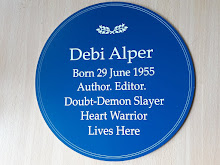Lost an hour of sleep and I think we all felt that loss keenly. Especially those who spent much of last night with 10 other people, stuffed into one of the tiny bedrooms, accompanied by a bottle of whisky and another of vodka. (I wasn't one of those people BTW but they could be identified this morning by the green hue of their gills and the capacious bags under their eyes.)
Today kicked off with another Festival panel of agents and publishers, this time including Beverley Birch (commissioning editor for Hodder Children's), Jonathan Telfer (editor of Writers' News), Hannah Westland (agent) and our very own Harry Bingham.
Let's get the bad news from this session out of the way. Many of you will already know that an agent is likely to take on 1 in a 1000 of the MSes submitted to them. It's sobering to then hear that most publishers will take approx 1 in 4-500 MSes submitted to them - by agents. Blimey, you're probably thinking, those odds are so long they're out of the stratosphere. But people DO get published, so it's vital not to lose heart.
There has to be some good news to keep us all going. The panel were asked what was exciting at the moment. Wouldn't you know, but the answer was the advent of the Kindle and e books, which they all saw as part threat and part opportunity. In the US, any publishers not already on board with the technology are apparently being left behind.
Social media and networks are providing lots of ways for people to self publish and also for those with traditional deals to promote in a way that has never existed before. With the traditional publishing model, the publicity machine kicks in 3 months before publication. Now that authors have a major part to play in publicising their own books, they can begin the process with blogs, websites, Facebook etc 12-18 months before their book hits the shelves, giving them the chance to build up an advance readership.
In a way, it's both good news and bad news that the author now has such a large part to play in the process. Bad because promotion takes very different skills to writing and also because it takes time and energy away from the actual process of writing; good because it does enable writers to have some control over the content and methods by which they are publicised. I remember when my books were first published, I was warned not to do anything at all, but to leave all the publicity to the 'experts'. But the truth is that no one is going to give your books - and indeed your career - the same amount of focus and attention that you can bring yourself.
There is still considerable tension between authors and agents regarding royalty rates for e books. Part of the problem is the ease with which people can use the digital format for self-publishing. They can then offer their books for sale for tiny sums - as little as 70p or even free, thereby pushing them up the Amazon charts. Although there is no quality control for those books, traditional publishers are being forced to compete with them and deal with the public expectation that books should be that cheap. So how much would that leave as a royalty rate for the published author? About as much as it costs to buy a cobweb.
Finally, the panel was asked what single piece of advice they would give to aspiring authors. The answer was one I've often advocated myself: read!
To this Harry added by pointing out the value of critiques and editing. He also said that anyone who comes to the Festival will inevitably leave a better writer. Wise man, that Harry Bingham.
Subscribe to:
Post Comments (Atom)


No comments:
Post a Comment